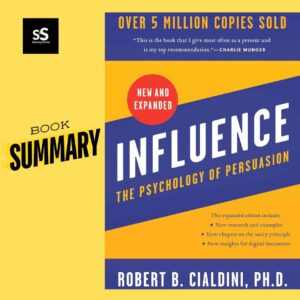Influence: the psychology of persuasion book summary
Influence: The Psychology of Persuasion Book Review
In his seminal work Influence: The Psychology of Persuasion, Dr. Robert Cialdini delves into the intricacies of human behavior and decision-making processes, shedding light on the art of persuasion. As a renowned psychologist and expert in the field of influence, Cialdini’s research provides valuable insights into how individuals can be swayed to make choices that may not align with their best interests.

Table of Contents
Key Points:
- Overview: The book serves as a comprehensive guide to understanding the principles of influence and persuasion.
- Author’s Background: Dr. Robert Cialdini is a distinguished psychologist and professor emeritus of psychology and marketing at Arizona State University.
- Importance: By comprehending the psychological mechanisms behind persuasion, individuals can navigate a world where influence is ever-present.
Key Concepts in Influence
Reciprocity
- Definition: Reciprocity is the idea that individuals feel obliged to return favors or acts of kindness.
- Examples: Providing free samples in retail stores often leads to increased sales as customers feel compelled to reciprocate.
- Influence on Decision-Making: Reciprocity can significantly impact consumer behavior and shape choices made in various contexts.
Commitment and Consistency
- Explanation: People have a tendency to stick to commitments they have made or remain consistent with previous statements and actions.
- Real-Life Applications: Brands often leverage this concept through loyalty programs to encourage repeat purchases and foster brand loyalty.
Social Proof
- Definition: Social proof refers to individuals relying on the actions and opinions of others to guide their own behavior.
- Importance: By observing others’ behavior, people seek validation and reassurance in their choices, leading to a herd mentality in decision-making processes.
Influence psychology
- Study of how individuals are influenced and persuaded.
- Focuses on the factors that impact decision-making and behavior.
Persuasion techniques
- Strategies used to influence others’ beliefs or actions.
- Includes methods such as reciprocity, scarcity, and authority.
Social influence
- Impact of others on an individual’s thoughts, feelings, and behaviors.
- Plays a significant role in shaping societal norms and group dynamics.
Behavioral psychology
- Study of how behaviors are influenced by internal and external factors.
- Examines the cognitive processes that drive human actions.
Decision-making process
- Series of steps involved in making choices.
- Influenced by cognitive biases, emotions, and environmental factors.
Cognitive biases examples
- Instances where individuals deviate from rational thinking.
- Cognitive biases affect judgment, decision-making, and beliefs.
Authority in persuasion
- Effectiveness of authority figures in influencing others.
- Establishing credibility and expertise enhances persuasive ability.
Scarcity persuasion tactics
- Utilizing limited availability to increase desirability.
- Scarcity tactics create a sense of urgency and value in decision-making.
Reciprocity in psychology
- Principle of responding to positive actions with similar actions.
- Reciprocity fosters goodwill and leads to a sense of obligation.
Commitment and consistency strategies
- Encouraging individuals to uphold commitments and stay true to their word.
- Consistency in behavior and actions reinforces persuasive messages.
Social proof definition
- Phenomenon where people look to others for guidance in uncertain situations.
- Social proof validates choices and influences decision-making.
Influence and manipulation
- Distinguishing between ethical influence and manipulative tactics.
- Understanding the boundaries between persuasion and coercion.
Persuasion research
- Studies that investigate the effectiveness of persuasive techniques.
- Research findings provide insights into human behavior and decision-making.
Marketing psychology
- Application of psychological principles in marketing strategies.
- Understanding consumer behavior and motivations to drive sales.
Consumer behavior insights
- Understanding how consumers make purchasing decisions.
- Insights into consumer preferences, motivations, and decision-making processes.
Frequently Asked Questions (FAQs) on Influence: The Psychology of Persuasion Book Summary:
Who is the author of Influence: The Psychology of Persuasion?
The book is authored by Robert Cialdini, a renowned psychologist and expert in the field of influence and persuasion.
What are some key concepts discussed in the book?
The book covers key concepts such as reciprocity, commitment and consistency, social proof, authority, liking, and scarcity, all of which play significant roles in influencing decision-making.
How can the principles of influence be applied in real-life situations?
The book provides insights and strategies on how individuals can harness the principles of influence to enhance their persuasive abilities and navigate various social interactions effectively.
What are some cognitive biases discussed in the book?
Influence: The Psychology of Persuasion delves into various cognitive biases such as the scarcity effect, the authority bias, and the liking bias, shedding light on how these biases impact decision-making processes.
Are there any case studies included in the book?
Yes, the book presents insightful case studies and real-world examples that showcase how the principles of influence can be applied in different scenarios to achieve desired outcomes.
Conclusion:
Influence: The Psychology of Persuasion offers a comprehensive exploration of the intricate dynamics at play when it comes to influencing others and understanding the psychology behind persuasive tactics. By delving into key concepts, persuasive techniques, cognitive biases, and real-life case studies, readers can gain valuable insights into the art of persuasion. This book serves as a valuable resource for individuals looking to enhance their persuasive skills and navigate the complex world of social influence with a deeper understanding of human behavior.
Discover marketing services, interviews & publishing tools at SharingStories.


